GeekyDad
Member
Man, there is and seemingly always has been such varying views on a healthy diet. Now, I know a lot of you are in a place right now where perhaps you don't really care about this sort of thing. This thread isn't really directed toward you. But I've gained some weight back over the holiday (big surprise, right?), and I really would like to shed it off again.
A bit of history about my diet over the past 10 years: I eat a salad everyday for lunch, along with fat-free yogurt and blueberries. On workdays, I have a Lara bar (or a 1/4 cup of nuts (usually almonds or walnuts) and a Kind breakfast bar, things I can eat on the go, for breakfast. And when I get home, I eat an apple (typically) or some other type of fruit and a protein (chicken-breast sandwich, rice and sardines, some sort of beans, etc. -- one of those things), and my natural cereal for dessert. I was drinking green tea before work and having coffee with cream and sugar only on my days off before I took my medical leave, but since returning back to work about eight months ago, it's been coffee with cream and sugar every morning before work. I have also fallen into the trap of eating munchies after work and on my days off -- cheese puffs, extra nuts, things of this nature.
So, I'm of course, doing research, trying different things. Yesterday before work, I'm reading about foods that help you burn fat. Oddly enough, they're mostly foods with fat: whole-milk yogurt, olive oil, fatty fishes, etc. Now, I've known fish is healthy for you, but just like nuts, you wanna eat that stuff in moderation. And there are the folks who just eat vegan, and so on and so on...
I'm not soliciting advice, but I would love to read other peoples' experiences regarding finding a healthy diet -- both their successes and failures. What have you tried, what are you eating now, how has it affected you, and what research have you found that you either find suspicious or you perceive as logical, etc.?
A bit of history about my diet over the past 10 years: I eat a salad everyday for lunch, along with fat-free yogurt and blueberries. On workdays, I have a Lara bar (or a 1/4 cup of nuts (usually almonds or walnuts) and a Kind breakfast bar, things I can eat on the go, for breakfast. And when I get home, I eat an apple (typically) or some other type of fruit and a protein (chicken-breast sandwich, rice and sardines, some sort of beans, etc. -- one of those things), and my natural cereal for dessert. I was drinking green tea before work and having coffee with cream and sugar only on my days off before I took my medical leave, but since returning back to work about eight months ago, it's been coffee with cream and sugar every morning before work. I have also fallen into the trap of eating munchies after work and on my days off -- cheese puffs, extra nuts, things of this nature.
So, I'm of course, doing research, trying different things. Yesterday before work, I'm reading about foods that help you burn fat. Oddly enough, they're mostly foods with fat: whole-milk yogurt, olive oil, fatty fishes, etc. Now, I've known fish is healthy for you, but just like nuts, you wanna eat that stuff in moderation. And there are the folks who just eat vegan, and so on and so on...
I'm not soliciting advice, but I would love to read other peoples' experiences regarding finding a healthy diet -- both their successes and failures. What have you tried, what are you eating now, how has it affected you, and what research have you found that you either find suspicious or you perceive as logical, etc.?



